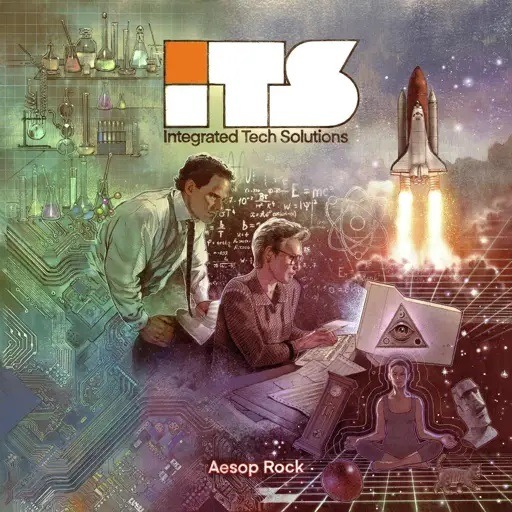A critique of how we criticize technology and innovation: A review of Aesop's “Integrated Tech Solutions”
- by Martín Cacho
- in Reviews

When someone brings up the theme of "technology" or “innovation” what springs to mind? What did your imagination conjure when you read the title of the album I'm about to review? AI? Brain-controlled, keyboardless computers? Cars rocketed up to mars? If someone claims that Aesop's latest album offers “a compelling critique of consumerism and technocracy culture”, what do you picture? a new chapter of Black Mirror or a continuation of Brave New World?
I am taking a wild guess and assuming some of what I mentioned aligns with your thoughts. But anyway, let me share something fascinating about this album: Aesop presents a captivating critique of technocracy and modern thinking by…
expressing his personal preferences:
“I like drawing pigeons…”
“I like rivers…”
“...I didn't like Van gogh… but today i decided that i like a painting of him”
Oh! And how does this relate to Christmas? Well, Aesop makes it very evident that the way we consider things as “technology” and “Innovations” is tied to our personal taste and biased beliefs.
I'm unsure how much basic education has changed now, but I recall, in my teenage years, being taught that the Middle Ages were characterized by a lack of technology and dangerous ways of thinking. On the other hand, the enlightenment movement is often credited with liberating us from that period's shadows and later fostering scientific thinking. This earned the Middle Ages the infamous label of "The Dark Ages." However, none of my classmates, not a single professor, ever mentioned the quantity and quality of inventions and technology developed during that era: oil painting, the invention of lowercase letters, the founding of universities, hands-free eyeglasses, among other things. Perhaps it's not the first thing that comes to mind when discussing technology, and one might be tempted to compare the "limited technology" of the ancient world with our high-tech telephones and gossiping-based societies made solely by satellite waves.
But consider: how would our current technology have evolved without the previous? More importantly, there are aspects of technology that go far beyond quantitative innovation. In the end the social condemnation of the middle ages originates from our taste, on the things we decide to pay attention to and label as technology or innovation.
This is even more evident in “On Failure”, where the author comically tells us a story on how “He decided” to like Van Gogh, or to be more exact, how he decided to like one of his paintings. After deciding his affinity to the painting he decides to research him and then He directs our attention to two things: First, that Van Gogh in just 9 years of activity as an artist created almost 2000 pieces of visual art, including drawings and paintings; second, that an article of wikipedia depicts sums up all his artistic endeavor and biography by saying: “He was a madman and a failure”.
Again here, the tome is already decided, in this case he decides to pay attention to art as a technology, and at the same time, by showing us his upset about summarizing Van gogh's career as “failure”, he shows us that when the deciding factor of “Technology” and “innovation” is art, those technocratic, consumerist and positivist values doesn't matter anymore. Money, scientific appraisal, all of those things are not THE determinants of success.
“...Even if he was in fact financially unsuccessful, and kind of a madman? A failure? I dunno…”
But my favorite track so far is "Pigeonometry." The song revolves around Aesop's passion for drawing pigeons. Through detailed depictions of various birds, he transcends them as individuals, addressing their physical traits; what the biologist often call "phenotypes," are addressed here as symbolic elements.
Then, in the middle section, Aesop recalls attending an exhibition on Da Vinci. From here it's inevitable to draw parallels between his own pigeon depictions and Da Vinci's monumental anatomical work, Vitruvian Man. The focus of the exhibition was to deconstruct Da Vinci's inventions and machines. Aesop humbly remarks, "I bet it was his imagination," emphasizing the power of images as the primary driver of technology. He humorously describes starting the following day by poorly drawing half a pigeon.
This song ingeniously compares Aesop's act of drawing pigeons to Da Vinci's revered and mystified work. Who are we to disagree? Aesop emphasizes drawing each pigeon individually rather than grouping them as a "flock." Similarly, the song's focus is on innovation and technology as individual entities, avoiding collective visions and stereotypes about technology.
Regardless of how innovative the idea of an exhibition featuring individual pigeons may be, and regardless of whether another artist has already explored it, Aesop conveys that innovation arises from careful observation and genuine engagement with the subject – or in this case, a pigeon.
In "Time Moves Differently Here," the song kicks off with a crazy intro featuring distorted voices and a slowed-down tempo. The conversation mimics someone ordering food at a drive-thru, portraying the drive-thru as a kind of time machine that distorts one's perception of reality and time itself. The critique on technology doesn't dwell on the machinery enabling the drive-thru; instead, it focuses on the inventions of the fast-food industry, highlighting the overwhelming options consumers face with sauces, beef patties, fries, and more.
These three examples reflect the type of content prevalent throughout the album: critiquing aspects of technology not commonly associated with it and challenging the measurement of values through money and numbers. When listening to this album, I feel like someone set René Guénon's profound book about the reign of numbers and signs to music.
If you want to hear something funny, clever, or simply want to enjoy a good pair of rhymes that don't talk about money, parties, and nightlife, you should definitely check out this album.
or post as a guest
Be the first to comment.


